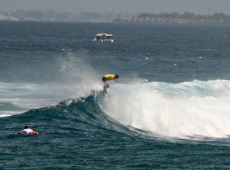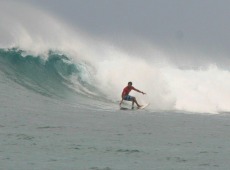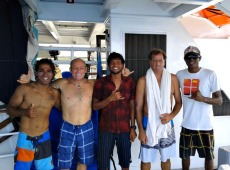The Maldives continues to face huge issues of food security, last year importing 90 percent of all goods consumed, while also being one of the most “oil vulnerable” countries in the world, according to a government report calling for significant economic diversification.
According to the Maldives Economic Diversification Strategy (MEDS), released last week, the nation has become “over-dependent on tourism”, with the industry last year accounting for more than two thirds of the Maldives’ Gross Domestic Product (GDP).
The report concluded that such a reliance on one sector alone had left the country’s economy particularly susceptible to natural disasters and adverse financial conditions.
“The Maldives needs to bridge swiftly the gaps that are emerging from the short-term political aims and the long-term economic goals,” stated the report’s introduction.
“Our vision for the Maldives is to become a high income, resilient, inclusive economy by 2025,” it added.
The MEDS reported that fuel imports last year totaled US$488 million or 22 percent of annual GDP. Meanwhile, US$389 million was spent bringing food into the country in 2012 – with demand predominantly made up of US$64 million in confectionery and beverages; US$60.1 million in meat, fish and seafood; and US$49.3 million in vegetables, root crops and spices.
The country’s official external debt was also said, on the basis of official figures, to have “increased significantly” to US$846.2 million – 38 percent of GDP – by the end of 2012, from US$ 959.1 million – 43 percent of GDP – in 2011.
Financial challenge
The government earlier this month said it hoped to secure longer-term financing to plug a shortfall in annual revenue that has seen the number of 28-day Treasury Bills (T-bills) sold by the state almost double by July 2013, when compared to the same period last year.
The comments were made just weeks after the Maldives Monetary Authority raised fears over the current “beyond appropriate” levels of government expenditure during 2013.
” Broad-based” economy
In an attempt over the next decade to transform the Maldives into one of Asia’s so-called “miracle economies”, such as Singapore and Hong Kong, the MEDS report, compiled by the Ministry of Economic Development, has outlined a ten sector strategy towards making the Maldives a “broad based export driven economy.”
“After having enjoyed rapid economic progress over three decades, our economic conditions changed dramatically following the Indian Ocean tsunami,” stated the report, which calls for a smaller, more prudent government moving forward.
“Since 2005, economic policy making in the Maldives has focused on crisis management. What is needed in the Maldives now is to move away from crisis related adhoc decision making to a clear vision, coherent strategies and coordinated policies.”
The MEDS report contained 10 sector specific plans for development of a more versatile economy. These include:
Transport
The government has pledged to boost the importance of transportation services to the economy by increasing their value to US$500 million by 2025 – from US$153 million last year.
According to the report, this focus will be achieved through expanding the capacity of existing transport hubs such as Ibrahim Nasir International Airport (INIA) and developing cruise ships terminals and a marina.
Despite this pledge, the government controversially scrapped a US$511 million contract signed under the previous administration with India-based infrastructure group GMR to develop and manage an entirely new airport terminal at INIA.
Earlier this week, Economic Development Minister Ahmed Mohamed was quoted in local media of accusing the former government of working to make the Maldives “an economic slave” to an unspecified foreign company.
Education
In the field of education, the government report has pledged a strategy of trying to develop higher education as a “priority expert sector” by working to transform the Maldives into a destination capable of attracting 15,000 international students a year.
Trade
For trading strategies, the MEDS has targeted developing local trade to increase value to US$500 million, from just US$96 million last year, partly through a focus on developing malls, boutique stores and e-shopping.
Tourism
In tourism, the Maldives will aim to nearly double current income value by 2025 through strategies to diversify into providing meetings, incentives, conferencing, and exhibitions – (MICE) facilities – in addition to wellness tourism and family orientated attractions.
The government has previously expressed a desire to commit to a number of these developments including the expansion of biospheres and developing other “value-adding” concepts via the Maldives’ fourth official tourism master plan, expected to be unveiled later this month.
The MEDS report anticipated that such developments would help increase the economic contribution of tourism to US$1.2 billion by 2025, from around US$555 million in 2012.
Health
The report has also pledged to develop the Maldives as a destination for international healthcare services via measures such as creating a medical college and a teaching hospital.
In June, the Ministry of Health identified current salary levels and staff safety as the key issues driving “shortages” in the number of trained medical staff coming from abroad to work at under-skilled hospitals in the Maldives.
Financial services
MEDS also expressed a desire to increase the financial service industry’s value to US$250 million by 2025 through the development of legal reforms and wider efforts to attract international banks to the Maldives.
The Maldives National Chamber of Commerce and Industries (MNCCI) argued in July that the country’s politicians had done little to address an ongoing shortage of US dollars and a lack of investment banking opportunities and arbitration legislation in the country.
Communication
The report pledges a strategy of increasing communication service value to US$500 million by 2025 – from US$159 million last year – by pursuing the development of IT parks in the nation as well as providing resorts specifically for research sabbaticals.
Agriculture
The MEDS also pledged to facilitate a means of boosting agricultural production to a value of US$ 150 million by 2025.
Campaigning back in May for the opposition Maldivian Democratic Party (MDP), former President Mohamed Nasheed unveiled an election strategy on the island of Kulhudhufushi in Haa Dhaal Atoll, that he claimed could lead the country to produce about 44 percent of the foodstuffs currently being imported into the country.
 MDP’s guest-house policy, like all of its policies, has been designed after extensive research, public consultation and with assistance and guidance of experts from the economic sector. During our public policy consultation process, which took the form workshops and repeated visits to local islands over several months, local entrepreneurs and concerned citizens alike consistently expressed their desire for an MDP policy “to bring tourism to our atoll”.
MDP’s guest-house policy, like all of its policies, has been designed after extensive research, public consultation and with assistance and guidance of experts from the economic sector. During our public policy consultation process, which took the form workshops and repeated visits to local islands over several months, local entrepreneurs and concerned citizens alike consistently expressed their desire for an MDP policy “to bring tourism to our atoll”. “In the light of extensive exposes, such ‘patronage’ is familiar to voters from the single party dictatorship of Gayoom and I believe they will simply say to each other ‘I told you so’,” MDP MP and Spokesperson Hamid Abdul Ghafoor told Minivan News today (September 3).
“In the light of extensive exposes, such ‘patronage’ is familiar to voters from the single party dictatorship of Gayoom and I believe they will simply say to each other ‘I told you so’,” MDP MP and Spokesperson Hamid Abdul Ghafoor told Minivan News today (September 3).

